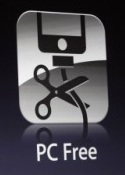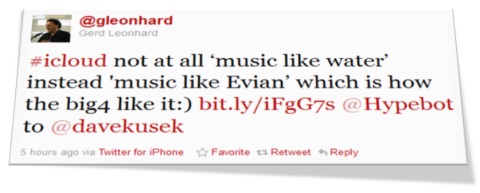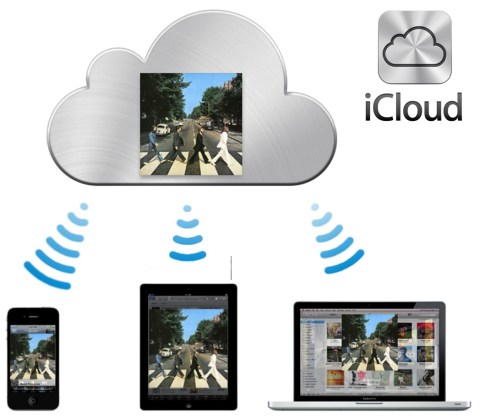Last week I wrote a post on how the iPad’s and iTunes’ dependency on USB-cable based content synchronization is undermining Apple’s post-PC agenda. This week in WWDC 2011, Steve Jobs took the stage to announce upcoming features to iOS5, including the iCloud service. Does this mean Apple is compatible with the cloud era requirements? Yes and no.
 Yes – in the sense that we will finally see the chord being cut on iOS device activation and operating system updates. Over The Air (OTA) updates will finally arrive, three years after the feature was available on Android. Well, at least they’re on the right track, making the 5th generation iPhone purchase experience more in line with the overall UX that Apple traditionally excels in. Wi-Fi sync of iTunes library content to iOS devices will certainly be helpful for people who are actually managing content with iTunes.
Yes – in the sense that we will finally see the chord being cut on iOS device activation and operating system updates. Over The Air (OTA) updates will finally arrive, three years after the feature was available on Android. Well, at least they’re on the right track, making the 5th generation iPhone purchase experience more in line with the overall UX that Apple traditionally excels in. Wi-Fi sync of iTunes library content to iOS devices will certainly be helpful for people who are actually managing content with iTunes.
No – because the biggest announcement from WWDC was aimed at solving the wrong problem: synchronizing files between devices. I’m of course talking about the seemingly wonderful service that iCloud will provide to millions of Apple customers living in the content management hell brought to them by previous Apple innovations. When acquiring digital content from iTunes store is made so convenient, you can easily end up in possession of a lot more digital content than you had before. Now, to make sure you continue to purchase content from iTunes store, it’s only natural that the store keeper will feel the need to make managing this content easier. Enter Apple iCloud, priced at $25 per year, which promises to remove the burden of moving files back and forth between different storage locations. iCloud will match your iTunes library content and make it downloadable (notice: not streamable) to any device registered to your Apple ID. Hurrah, problem solved! Or is it?
Here’s the thing: we don’t need a better way to synchronize music files, we need a way to remove files altogether. I don’t want to own bits if I don’t have to. Ever since I signed up for a Spotify subscription, the real need for me to manage digital music files locally on my gadgets has in practice already been removed. That’s because Spotify is not a store like iTunes, it’s a service. Anyone familiar with the cloud computing concept will probably know the term SaaS, software as a service. What this means is that you no longer purchase a copy of the installation media or bits for a software application, rather you subscribe to a service that delivers the application to you (most often through a browser). Subscription based services for music delivery, such as Rdio and Spotify, have already brought the SaaS revolution into our PC’s, smartphones and iPods. Why purchase music as bits if you can get them as a service?
 In the business IT lingo people are talking about public cloud, hybrid cloud and private cloud. Basically the first one is a “real” cloud service like Gmail or a private business application built on a publicly available cloud platform like Windows Azure. The last one is used when trying to operate with many of the principles of the cloud, while still remaining in possession of your own servers and application instances, perhaps located in an external data center. Hybrid… well, let’s not go there. A label that some people have cast on the private cloud option is “false cloud“. I think this also fits with what Apple has introduced to the world as their version of the cloud. It initially looks like a cloud service for music (“all your music available anywhere!”), but in reality it’s a cloud service for files (“…just the music you already had somewhere”). Blah.
In the business IT lingo people are talking about public cloud, hybrid cloud and private cloud. Basically the first one is a “real” cloud service like Gmail or a private business application built on a publicly available cloud platform like Windows Azure. The last one is used when trying to operate with many of the principles of the cloud, while still remaining in possession of your own servers and application instances, perhaps located in an external data center. Hybrid… well, let’s not go there. A label that some people have cast on the private cloud option is “false cloud“. I think this also fits with what Apple has introduced to the world as their version of the cloud. It initially looks like a cloud service for music (“all your music available anywhere!”), but in reality it’s a cloud service for files (“…just the music you already had somewhere”). Blah.
iCloud will no doubt become a success. Knowing Apple’s track record in delivering excellent usability, it may well turn out to be a killer product for cloud adoption among consumers. I can imagine it becoming “Dropbox^2” in its ability to solve day-to-day file synchronization problems, which is surely great news. What the iCloud will not do is make the iTunes paradigm relevant again, for those customers who’ve already left their bits behind. In my eyes, Apple has become a victim of its past success in selling both the hardware for media consumption as well as the content. Evolution over revolution is a safe bet to make when you’re riding on the top of the evolution wave. iCloud could have been Apple’s revolution, but now it looks like the revolution may take place elsewhere.


0 Responses
Stay in touch with the conversation, subscribe to the RSS feed for comments on this post.